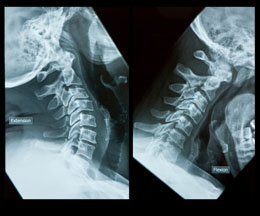There are several bulging disc symptoms which can help a person identify and diagnose this condition. Read through this following Buzzle article to learn a little more about this condition and the symptoms that it leads to.

A bulging disc is also known as spinal disc herniation or a herniated disc. This is a condition that affects the spine wherein there is a tear in the outer fibrous ring of an intervertebral disc, which causes the soft central portion of the disc to bulge out. This kind of a tear in the disc may result in the release of inflammatory mediators which may cause severe pain, even if there is no nerve root compression. Bulging disc is normally a development of a previously existing disc protrusion.
Bulging Disc Signs and Symptoms
The symptoms of a herniated disc will vary depending on the exact location and type of soft tissue that is involved. In some cases, the person may be absolutely asymptomatic and may not feel any pain at all. This may occur if the disc is the only tissue that is injured and if the extruded nucleus material doesn't press on any soft tissues and nerves. Also, sometimes, the prolapse may be small and may occur away from the nerves due to which the person may not show any symptoms.
Neck Pain
Symptoms of cervical bulging disc include, mainly, neck pain. This pain may be severe and may be aggravated with sudden movements made to the side. The person may also complain of tingling and numbness in the upper extremities. In severe cases, there may be pinched nerve in the neck symptoms, like sharp, burning pain and varying degrees of weakness in the arms and hands.
Lower Back Pain
The person may complain of shooting lower back pain or sciatica. This occurs when there is a bulging disc in the lumbar region. There is unrelenting lower back pain which may radiate to other regions depending on the nerve roots that are being affected and irritated. There may be sensory changes like numbness and paresthesia. The reflex response of a person may also get affected. Typically, the symptoms are seen on one side of the body. At times, it is said that the severe lower back pain may be due to other reasons besides nerve compression, like inflammation.
Cauda Equina Syndrome
A rare but emergency condition known as cauda equina syndrome (CES) may be seen in cases of nerve root problems that are caused due to a bulging disc. This is a rare disorder where the nerves present at the end of the spinal cord get compressed. This syndrome leads to lower back pain and other problems like loss of bowel and bladder functioning, due to which the person has digestion problems and anuria or oliguria (inability to pass urine). There may also be numbness in the saddle area and weakness in either one or both legs. This syndrome requires immediate treatment so as to prevent any kind of permanent damage to the bladder and bowel nerves.
Most of the symptoms given above are spurred on by irritation of spinal nerves. Thus, the first line of treatment will depend on the location of the bulging disc and will involve conservative methods (like exercises) which will help provide some amount of relief. Other kinds of physical therapy and massage therapy will also help. For the pain, the person can take pain killers like, non-steroidal anti-inflammatory drugs that will help mitigate the symptoms of inflammation. Surgery should only be opted for as the last resort, when there is no considerable improvement in the bulging disc symptoms after trying out all the conservative approaches.
Disclaimer:
The information provided in this article is solely for educating the reader. It is not intended to be a substitute for the advice of a medical expert.


 A bulging disc is also known as spinal disc herniation or a herniated disc. This is a condition that affects the spine wherein there is a tear in the outer fibrous ring of an intervertebral disc, which causes the soft central portion of the disc to bulge out. This kind of a tear in the disc may result in the release of inflammatory mediators which may cause severe pain, even if there is no nerve root compression. Bulging disc is normally a development of a previously existing disc protrusion.
A bulging disc is also known as spinal disc herniation or a herniated disc. This is a condition that affects the spine wherein there is a tear in the outer fibrous ring of an intervertebral disc, which causes the soft central portion of the disc to bulge out. This kind of a tear in the disc may result in the release of inflammatory mediators which may cause severe pain, even if there is no nerve root compression. Bulging disc is normally a development of a previously existing disc protrusion.